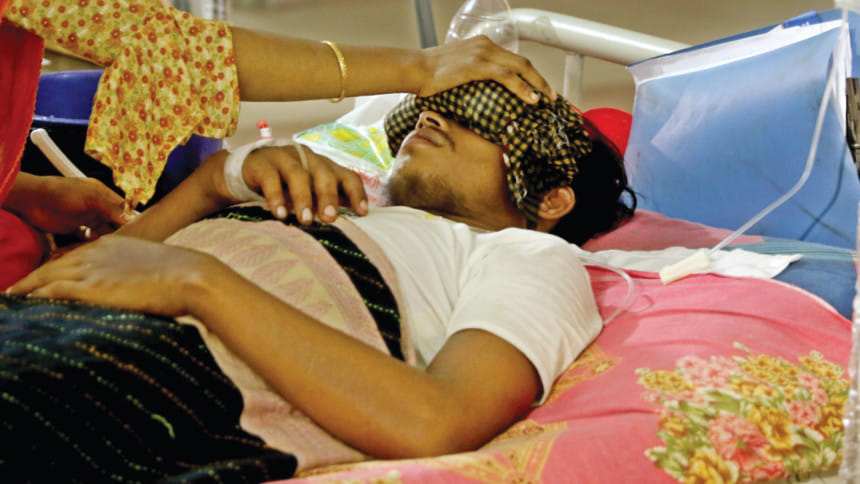Dengue Fever: Record 820 hospitalised in a day

At least 820 people were hospitalised with dengue and two others died from the disease in the 24 hours preceding 8:00am yesterday, said the health directorate.
This is the highest number of hospitalisation from dengue in a day this year. The total number of hospitalised patients was 2,502 yesterday, according to the Directorate General of Health Services (DGHS).
As of yesterday, at least 12,118 dengue patients got admitted to different hospitals this year, and of them, 67 had died.
During the same period (January 1-June 8) last year, only one patient died from the mosquito-borne disease and 1,376 were hospitalised.
In 2022, the number of deaths from dengue was 281 and there were 62,382 hospitalisations, of which 23,162 were outside Dhaka.
The number of hospitalisations started rising in May and peaked in October last year. But this year, the number started climbing in April.
"It is highly likely that both dengue cases and deaths from it will break records in August-September," Kabirul Bashar, professor and entomologist at Jahangirnagar University, told The Daily Star.
The Transparency International Bangladesh (TIB) yesterday urged the government to declare a 'public health emergency'.
The government should immediately make a roadmap to save people from dengue, it said in a statement.
"It is highly likely that both dengue cases and deaths from it will break records in August-September."
It urged the government to form an expert panel akin to what was formed amid the Covid-19 pandemic and take its suggestion regularly.
The country's dengue situation has turned "deadly" due to a lack of coordination among the authorities responsible to control it, TIB said.
Dengue is not under control because of irregularities, corruption, and lack of accountability in city corporations, it added.
The initiatives taken are sporadic and ineffective, it said.
The DGHS in its pre-monsoon study recently forecasted an alarming situation over the density of Aedes larvae and mosquitoes in most areas of the capital, TIB said.
Since dengue has spread across the country, the shortcomings of city corporations and municipality authorities across the country should be identified and addressed, said TIB Executive Director Iftekharuzzaman.
"There was a forecast that the situation might turn deadly. However, the efforts made by the two city corporations in the capital are frustrating," he added.
Instead of relying only on insecticides, the two city corporations should work in coordination with the health directorate, he said.
A year-long programme should be launched to reduce the mosquito population and create awareness about Aedes through different means including social media, he said.
Neighbourhood-based voluntary groups with participation of public representatives can be formed, possibly with Bangladesh Red Crescent Society on board, he added.

 For all latest news, follow The Daily Star's Google News channel.
For all latest news, follow The Daily Star's Google News channel. 







Comments